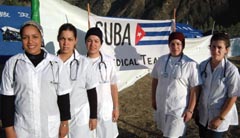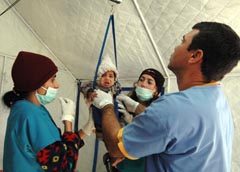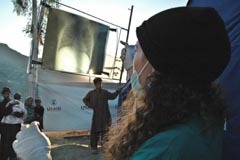
December 13, 2005

December 13, 2005
Recently Graduated Cuban Doctors
Making an Immediate Impact
JUVENAL BALAN
NEYRA: Text and photos
(Special Correspondent)
Youth is amply represented in the Henry Reeve International Brigade of Cuban healthcare workers that are lending a hand after the devastating earthquake that shook Pakistan on October 8.
 RECENT
GRADUATES FROM LEFT TO RIGHT DRS. Yanelis LeOn DurAn, Nadia Guelmes RodRIguez,
Yurelkys PErez GutiErrez, Tanet Dailey GarcIa ConcepciOn y Dianelys NUNez Ruiz.
RECENT
GRADUATES FROM LEFT TO RIGHT DRS. Yanelis LeOn DurAn, Nadia Guelmes RodRIguez,
Yurelkys PErez GutiErrez, Tanet Dailey GarcIa ConcepciOn y Dianelys NUNez Ruiz.
The Cuban tent hospital in Maira, a province in Northeast Pakistan, is one of these camps overflowing with youthful vigor. Among the collective are five young female doctors whose September 19 graduation is still very fresh in their memory. The young women give an invigorating touch to the medical office, laboratory, dormitories and even the kitchen.
Without a doubt, the work these doctors are currently carrying out in Pakistan is the best postgraduate training they could hope for. It’s the first time any of them have traveled so far from their country.
"It’s an honor for us to be part of this contingent," said Dr. Yanelis Leon Duran. "We were taught to practice our profession unconditionally and to help anyone in need. We’ve learnt what an earthquake is, there are aftershocks almost everyday. When we came here we found a community lacking in healthcare and we were confronted with illnesses that are unknown in Cuba such as child malnutrition and other gastrointestinal infirmities. We also discovered a culture very different from our own, but we feel like we are useful here and we are starting to become doctors."
 IN
THE MAIRA TENT HOSPITAL
IN
THE MAIRA TENT HOSPITAL
YOUTH ABOUNDS.
Nadia Guelmes Rodriguez proudly shares with us memories of her first medical shift: "An adult patient came in suffering from a bronchial asthmatic attack. I prescribed her aminophylline and hydrocortisone, which right away restored her breath and she hugged me, overjoyed. Minutes later another women came in who I thought was the patient. To my surprise when she unwrapped her clothing I saw that she was carrying a nine-day-old baby girl, wrapped in cloth that weighed just 1,200 grams. The mother came to ask me why the girl wasn’t suckling. I started to explain to her, despite the language barrier and using hand signals, how to breastfeed. I squeezed her breast to show her that they were full of milk and gathered the milk in a glass. Then I took the girl in my arms and feed her the milk together with supplementary vitamins and told the mother to come back for another visit. We are providing the people here with the right to healthcare."
Tanet Dailey Garcia Concepcion is one of those women that always gets along with everyone. In her diary she wrote that a little girl’s life had been saved thanks to the Cubana de Aviacion airline and she told us why. "I took the little pillow and blanket as a souvenir from the Cubana flight that brought us here to Pakistan. They really came in handy. A father came with his one-year-old girl who looked like she was around three-months-old. The little girl was dehydrated and suffering from severe diarrhea. We put her on intravenous treatment and cleaned her up completely. I used the pillowcase to make a diaper and wrapped her in the blanket. I gave her some orange juice, low in sugar and high in potassium. When I put the teaspoon to her lips she eagerly drank. We them decided to evacuate her to the Battagram Hospital."
 the
cuban tent hospital offers specialized care.
the
cuban tent hospital offers specialized care.
Yurelkys Perez Gutierrez also spoke about her first days as an international doctor. "I feel really satisfied to make my little contribution as a doctor formed by the Cuban Revolution. The patients I attend to come from the refugee camp located close to our medical station. I attended a women with an ulcer whose son brings her to our office every day. Many of the locals know us now and come often. They feel in good hands with the Cuban medical assistance and don’t know how to thank us. A few days ago we were invited to a wedding in the refugee camp. It was incredible to learn about their customs; I think it was an indication of their trust and friendship."
Dr. Dianelys Nunez Ruiz was among the first Cuban healthcare workers to come to Maira. "There were 17 of us who first came and started setting up the camp. The first big shock was adapting to life in a tent and to the cold weather, but we quickly got used to both. One of the events that really effected me was treating a five-year-old boy who weighed only four and a half kilos. Another incident that stands out was when I was attending to an elderly lady. After treating her and giving her free medicine, the patient took my hands and squeezed them tightly and started to bless me in Pahto. I would like to mention the help we have received from the Pakistan Armed Forces located in the area. They took us in and protect us with great care."
Tanet, Yurelkys,Yanelis, Nadia and Dianelys were among the doctors who were with medical kits in hand, awaiting to give emergency help to the victims of Hurricane Katrina in New Orleans. But the Bush administration rejected their assistance with silence to the Cuban offer. Nonetheless, these same youngsters, with the same medical kits, are now giving their best to the benefit of thousands of Pakistanis effected by the severe earthquake. Without a doubt, Pakistan has been their true graduation.
Graduación con mayúsculas
JUVENAL BALÁN NEYRA: Texto y fotos
(enviado especial)
http://www.granma.cubaweb.cu/2005/12/13/nacional/artic03.html
La juventud es mayoritaria en el hospital de campaña de Maira, provincia del Noroeste, en Paquistán. Las chicas les dan un toque juvenil a las consultas, laboratorio, dormitorios y hasta a la cocina, donde se empeñan en terminar unos garbanzos, como para chuparse los dedos.
 Recién
graduadas, de izquierda a derecha, las doctoras Yanelis León Durán, Nadia
Guelmes Rodríguez, Yurelkys Pérez Gutiérrez, Tanet Dailey García Concepción y
Dianelys Núñez Ruiz.
Recién
graduadas, de izquierda a derecha, las doctoras Yanelis León Durán, Nadia
Guelmes Rodríguez, Yurelkys Pérez Gutiérrez, Tanet Dailey García Concepción y
Dianelys Núñez Ruiz.
Entre el colectivo, hay cinco féminas —cuatro espirituanas y una pinareña— que aún tienen fresco en la memoria el día de su graduación, el 19 de septiembre, en el coliseo de la Ciudad Deportiva en Cuba. Ahora están en Paquistán, como parte del contingente internacional Henry Reeve, prestando su ayuda solidaria a los damnificados del devastador terremoto del pasado 8 de octubre.
Sin duda la estancia de estas doctoras en tierra paquistaní constituye el mejor posgrado de su carrera. Es primera vez que se trasladan a tantos kilómetros de distancia de nuestro país. Ellas lo corroboran en sus opiniones.
"Es un honor para nosotras integrar este contingente, dijo la doctora Yanelis León Durán. Nos formamos en la convicción de ser incondicional y prestar la ayuda necesaria a quien lo necesite. Ya sabemos lo que es un temblor de tierra. Las réplicas son casi todos los días. Encontramos una población carente de salud y chocamos con patologías desconocidas para nosotras, tales como desnutrición infantil y otras enfermedades gastrointestinales. Descubrimos una cultura distinta a la nuestra, pero nos sentimos útiles, empezamos a ser médicos."
 En
el hospital de campaña de Maira reina la juventud.
En
el hospital de campaña de Maira reina la juventud.
Nadia Guelmes Rodríguez con satisfacción nos cuenta los detalles de su primera guardia médica: "Llega una paciente adulta con crisis de asma bronquial. Le indiqué una aminofilina y una hidrocortisona, se le quitó la falta de aire y me abrazó, no sabía qué hacer conmigo. Minutos más tarde llegó una mujer a la que creía paciente, pero para mi asombro, entre sus ropajes traía una niña de nueve días de nacida, envuelta en paños, que pesaba 1 200 gramos. Quería consultarla porque la pequeña no succionaba. Comencé explicándole, a pesar de las barreras del idioma utilizando señas, cómo hacer la lactancia materna. La ordeñé para que viera que sus mamas tenían leche y después tomé en mis brazos a la niña, para en un vasito darle la leche y suplementos vitamínicos, indicándole reconsulta. Estamos dando a los pacientes su derecho a la salud."
Tanet Dailey García Concepción es de esas chicas que siempre se ganan la simpatía en un colectivo. En su diario quedó escrito que una pequeña paciente había sido salvada gracias a "Cubana de Aviación" y ahora nos explica el porqué: "Traje conmigo de recuerdo la almohadita y la frazada del avión de Cubana que nos transportó hasta Paquistán. Y me fueron muy útiles. Un padre llegó con su hija de un año y parecía una lactante de tres meses. Venía deshidratada y con un cuadro diarreico muy fuerte. Canalizamos la vena, la limpiamos toda. Utilicé la funda de la almohadita para confeccionarle un culero con varios apósitos y la frazada sirvió para abrigarla. De mi reserva alimenticia le di un jugo de naranja, bajo en azúcar y rico en potasio. Cuando le puse la cucharadita en los labios lo tomó deseosa. La indicación médica fue evacuarla para el hospital de Battagram."
 El
hospital cuenta con los servicios suplementarios que enriquecen la asistencia
especializada.
El
hospital cuenta con los servicios suplementarios que enriquecen la asistencia
especializada.
Yurelkys Pérez Gutiérrez al hablarnos de sus primeros días como médico internacionalista manifestó: "Me siento contenta por poner mi granito de arena como médico formada por la Revolución cubana. Los pacientes que he atendido vienen del campamento de refugiados que hay cerca de nuestro hospital de campaña. Atendí a una mujer con úlcera y el hijo la trae todos los días a consulta. Ya muchos nos identifican. Vienen a menudo. Se sienten seguros con la asistencia médica. No saben cómo agradecernos. Hace pocos días nos invitaron a una boda en su campamento. Fue impresionante conocer sus costumbres y creo que es una muestra de amistad y confianza."
Pinar del Río es el terruño de la doctora Dianelys Núñez Ruiz. Fue una de las primeras en llegar a este campamento y al respecto señaló: "Al principio arribamos 17 compañeros y armamos el campamento. Consultábamos donde podíamos. El primer cambio brusco fue la vida en campaña y también las bajas temperaturas, pero enseguida nos adaptamos. Me impactó consultar a un niño de cinco años con cuatro y medio kilogramos de peso. Otro caso que me impresionó fue una anciana, después de atenderla, recibió las medicinas gratuitas y me cogió mis manos, las apretó y comenzó en dialecto pashtún a bendecirme. Quiero destacar la ayuda que hemos recibido de las Fuerzas Armadas de Paquistán ubicadas en la región, quienes nos han acogido y nos protegen con sumo cuidado."
Tanet, Yurelkys,Yanelis, Nadia y Dianelys estuvieron
"con las botas puestas" y la mochila a la espalda, listas para acudir en ayuda
de emergencia a los damnificados norteamericanos por el Katrina. El imperio lo
impidió, pero lo que no pudo evitar es que ahora, esas mismas jóvenes, con las
mismas botas, mochila y bata blanca, estén dando lo mejor de sí a favor de los
miles y miles de paquistaníes que fueron afectados por el fuerte sismo. Sin duda
es una GRADUACIÓN con mayúsculas.
home